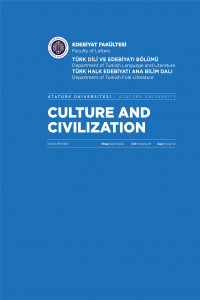Ngugi wa Thiong’o’nun Bir Buğday Tanesi Romanında Postkolonyal Bellek, Kültür ve Kimlik
Ngugi wa Thiong’o, edebiyat dünyasının Afrikalı yazarların dünya edebiyatına katkısını kabul etmelerinde öncü bir yazar olmuştur. Eserlerinde Kenya’daki İngiliz sömürgeciliğinin bireysel ve ulusal travmalarını anlatır. Ngugi’nin üçüncü romanı Bir Buğday Tanesi (1986), bağımsızlık sürecindeki Kenya’yı, yani Uhuru’yu konu almaktadır. Roman, sömürgeciliğin Kenya toplumu ve kültürü üzerindeki etkisini ve sömürgeciliğin mirasının ülkenin kimlik ve güç dinamiklerini şekillendirmeye nasıl devam ettiğini ele alır. Bununla birlikte, Kenyalıların uzun süredir arzuladıkları bağımsızlık, ülke ve halk için acı çekmeden gerçekleşmeyecektir. Karakterlerin travmatik deneyimleri sosyal ve kültürel çalkantılarla kesiştikçe kimlik de sorunlu hale gelmektedir. Karakterler travmatik anılarından kaçmaya ve Uhuru ile yeni bir başlangıç yaşamaya çalışırlar, ancak kendilerini geçmişlerinden arınmak zorundadırlar.
Bir Buğday Tanesi, karakterlerin geleneksel Afrika kültürü ile İngiliz sömürgeciliğinin dayattığı kültürel normlar arasındaki çatışmalarını ele alarak kültürel meseleleri de irdeler. Roman, geleneklerin ve kimliğin korunmasında kültürün ve tarihin önemine ve sömürgeciliğin baskısı altındaki kültürel çözülmenin tehlikelerine dikkat çemektedir. Bu bağlamda Ngugi wa Thiong’o’nun Bir Buğday Tanesi adlı romanı postkolonyal bağlamda bellek, kültür ve güç temalarını ele almaktadır. Roman, sömürgeciliğin Kenya halkı ve kültürü üzerindeki etkisi ve sömürgeciliğin tahakkümünü nasıl muhafaza ettiği ve sürdürdüğü hakkında temel sorular ortaya koymaktadır. Bu makale, romanın sömürgeciliğin romandaki karakterlerin anılarına ve kültürel kimliklerine nasıl derinlemesine gömülü olduğunu gösterdiğini savunmaktadır. Bu nedenle bu makale, eserde bellek ve kültürün sömürgeci baskıya direnmek ve bu baskıyı ortadan kaldırmak için nasıl kullanılabileceğine dair örnekleri inceleyecektir.
Anahtar Kelimeler:
kültür, bellek, tarih, kimlik, postkolonyal
POSTCOLONIAL MEMORY, CULTURE, AND IDENTITY IN NGUGI WA THIONG’O’S A GRAIN OF WHEAT
Ngugi wa Thiong’o has been a catalyst for the literary world to acknowledge the contribution of African writers to world literature. In his works, Ngugi narrated his individual and national traumas of British colonization in Kenya. His third novel, A Grain of Wheat (1986), is about Kenya on the road to its independence, Uhuru. The story explores the influence of colonialism on Kenyan people and their culture and how the legacy of colonialism persists in shaping the country’s identity and power dynamics. Nevertheless, the long-sought independence of Kenyans has not been without suffering for the country and its people. Identity becomes problematic as the traumatic experiences of the characters intersect with social and cultural upheavals. The characters attempt to escape their traumatic memories and begin afresh with Uhuru, though they have to redeem themselves from the past.
A Grain of Wheat also explores cultural issues as the characters navigate the conflict between traditional African culture and the cultural norms imposed by British colonialism. The novel highlights the importance of culture and history in preserving traditions and identity and the dangers of cultural dissolution under colonialism. Ngugi wa Thiong’o’s A Grain of Wheat explores the themes of memory, culture, and power in a postcolonial context. The novel introduces essential questions about the influence of colonialism on Kenyan people and culture and how the colonized maintain and contend its authority. This article argues that the novel shows how colonialism is deeply embedded in the memories and cultural identities of the characters in the novel. Therefore, the paper offers insights into how memory and culture are used to resist and resolve colonial oppression.
Keywords:
culture, memory, history, identity, post-colonial,
___
- Bhabha, H. K. (1994). The Location of Culture. Psychology Press.
- Burney, S. (2012). Edward Said and Postcolonial Theory: Disjunctured Identities and the Subaltern Voice.
- Counterpoints, 417, 41–60. http://www.jstor.org/stable/42981699.
- Chakrabarty, D. (2009). Provincializing Europe: Postcolonial Thought and Historical Difference-New Edition. Princeton University Press.
- Fanon, F. (1968). The Wretched of the Earth.
- Fanon, F. (2008). Black Skin, White Masks. Grove Press.
- Ginsburg, S. (2009). Signs and Wonders: Fetishism and Hybridity in Homi Bhabha’s The Location of Culture. Cr-the New Centennial Review. https://doi.org/10.1353/ncr.0.0082
- Harrow, K. (1985). Ngugi wa Thiong’o’s “A Grain of Wheat”: Season of Irony. Research in African Literatures, 16(2), 243–263. http://www.jstor.org/stable/3819414
- Jabbi, B.-B. (1985). The Structure of Symbolism in “A Grain of Wheat.” Research in African Literatures, 16(2), 210–242. http://www.jstor.org/stable/3819413
- Hall, S. (1990). Cultural identity and diaspora: Identity: community, culture, difference.
- Lemkin, R. (2008). Axis Rule in Occupied Europe: Laws of Occupation, Analysis of Government, Proposals for Redress. The Lawbook Exchange, Ltd.
- Said, E. W. (1993). Culture and Imperialism. Alfred A. Knopf.
- Smith, P. L. T. (1999). Decolonizing Methodologies: Research and Indigenous Peoples. Zed Books Ltd.
- Spivak, G. C., Nelson, J. P. O. L. a. a. S. C., Nelson, C., Grossberg, L., & Grossberg, L. (1988). Marxism and the Interpretation of Culture: Can the Subaltern Speak? University of Illinois Press.
- Thiong’o, N. W. (1986). A Grain of Wheat. Heinemann.
- Başlangıç: 2021
- Yayıncı: Atatürk Üniversitesi
Sayıdaki Diğer Makaleler
ÂŞIK TARZI HİKÂYE GELENEĞİ ARAŞTIRMALARINDA BİLGİ VE YÖNTEM GÜNCELLEME SORUNLARI VE ÇÖZÜM ÖNERİLERİ
PROF. DR. OSMAN TÜRER, ANA HATLARIYLA TASAVVUF TARİHİ.
Ngugi wa Thiong’o’nun Bir Buğday Tanesi Romanında Postkolonyal Bellek, Kültür ve Kimlik
“CANDIDE”IN TÜRKÇE ÇEVİRİLERİNİN EREK ODAKLI KURAM VE ÇEVİRİ STRATEJİLERİ AÇISINDAN İNCELENMESİ
Büşra SADELER GÖZCÜ, Perihan YALÇIN
TÜRK HALK ANLATILARINDAN AHMEDİ’NİN İSKENDERNAME'SİNE DEV MOTİFİ
